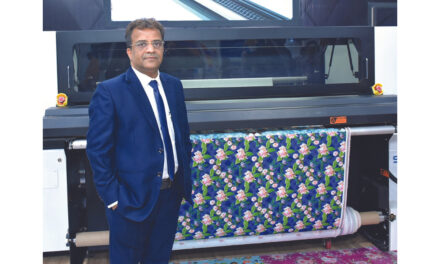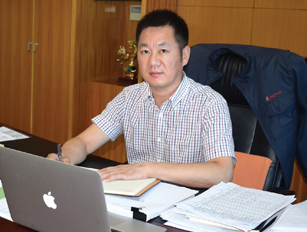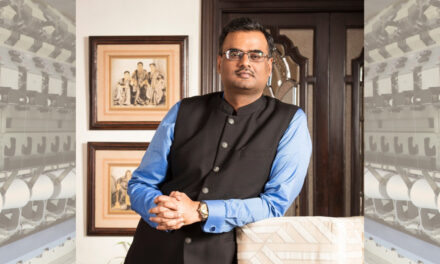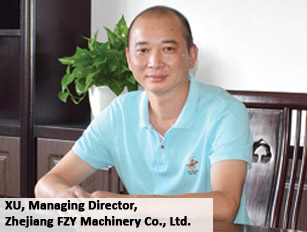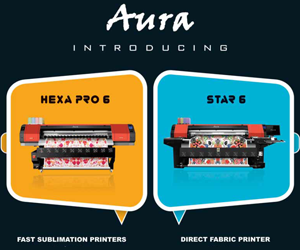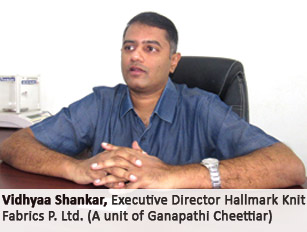
AGC as a company conceptualized in the year 1948, started cotton trading at Tirupur, located and strategically well positioned amongst ginning and spinning mills, in the Southern part of India. Over two decades ago (in 1987), the company ventured into yarn trading with our primary products, Colour mélange and fancy yarn. Today, AGC is recognised as a leading knitting yarn supplier in India. The oldest and biggest retaileAGC as a company conceptualized in the year 1948, started cotton trading at Tirupur, located and strategically well positioned amongst ginning and spinning mills, in the Southern part of India. Over two decades ago (in 1987), the company ventured into yarn trading with our primary products, Colour mélange and fancy yarn. Today, AGC is recognised as a leading knitting yarn supplier in India. The oldest and biggest retailer of prestigious “Lenzing” and “Amsler” yarn products and continue providing – High quality, customer-focused, advanced knit products. To know more about the company, its recent developments and future plans Apparel Views Editor Arvind Kumar recently met and interviewed Vidhyaa Shankar, Executive Director, A Ganapathi Cheettiar. Given are some excerpts from the conversation.r of prestigious “Lenzing” and “Amsler” yarn products and continue providing – High quality, customer-focused, advanced knit products. To know more about the company, its recent developments and future plans Apparel Views Editor Arvind Kumar recently met and interviewed Vidhyaa Shankar, Executive Director, A Ganapathi Cheettiar. Given are some excerpts from the conversation.
Please tell us about your new Sofino Motherly babysoft fabric and Elegant knitted fashion?
Sofino Motherly babysoft fabric is actually a very fine knitted fabric in different blends ideally suited for infants’ right from age zero to the time they are 2-3 years old. With over 69 years of experience and customer confidence we are offering a world class product. Our fine count cotton fabric knitted on finer guage interlock machine is breathable, highly soft, comfortable and elegant for the baby to feel like mother’s touch.
Besides, there are already knitted shirts doing the rounds in the market. However, they still continue to ‘look’ like conventional T-shirts. This is where our product is different. They ‘look’ woven, while offering the ‘feel’ of a knitted garment. What is more the fabric is also suitable to cater to any segment, whether it is casual, semi-formal, formal or party wear. We firmly believe that this particular product has huge market potential.
Our Sofino the elegant knitted fashion comes with NanoknitTM technology designed with latest automated specialised machinery & yarn to develop intensified knit structure dedicated to formal fashion. We are happy to deliver thoroughly researched innovative knitted fabric suited for shirts, trousers, blazers, travelwear and workwear. Finely crafted fabrics provide woven look & knitted feel. It is most suited for high fashion brands in need of exclusive fabrics. It is available in various blends with or without stretch like 100 per cent Superfine cotton Supima Cotton, Giza Cotton, Bamboo Cotton, Modal Cotton, Poly Cotton, Poly Viscose, Poly modal, Poly Bamboo, Bamboo Poly Cotton, Nylon, Ecovera, Indigos.
What all other products do you make when you say specialized products?
Since we deal with specialized products, we ensure that the best of quality in a given blend is maintained. We have a dedicated QA team that makes sure that all our products are validated and tested. The products are also sent along with the test reports. AGC is today a hub of product source and knowledge base for garment manufacturers, buying houses, textile institutes, research associations and spinning mills in India. The all-encompassing assortment of our products comprise of Lenzing Viscose Ring spun & Vortex, Lenzing Modal, Lenzing Tencel, Bamboo Blends, Amsler Effect (Slub) Yarn, Melange & Fibre Dyed Yarn, Polyester & Blends, ‘S&Z’ Twist, Organic Cotton (GOTS Certified), Supima cotton yarn, 100 per cent Linen, Cotton/Linen, Nano Slub (Linen look), Injected Slub, Melange Slub, Poly/ Cotton Slub, Viscose Slub, Indigo Denim Yarn. Our Knitting division is equipped with latest machinery (German-Terrot & Japanese-Fukuhara) to produce high class knitted fabrics.
Everyone was hit by GST in the last 6-7 months. Has it improved now in the Tirupur?
No. In fact, it has gone from bad to worse actually. As far as the export market is concerned, people are having very difficult times. Yes, refund is there but carton prices are going up. They’re not able to match and the orders are not that great in the sense that they’re not able to match the prices.
Where do you think the government is lacking in terms of policy?
On one side you have the concept of ‘Make in India’. But on the other side, garment is having quota based import from Bangladesh and Sri Lanka. The garments are coming without duty from Bangladesh and Sri Lanka also to an extent. Ultimately, in the domestic market also, the garments get supplied from outside of India. So there is a contradiction on what is the expectation. Sri Lanka has also started focusing on India, though not to a greater extent but duty wise, they do have some advantages compared to imports from other countries.
Looking at the current industry scenario, how do you see the future in the next 4-6 months?
People are accepting all the new concepts that we’re taking. There’s a big amount of acceptance in the market because we’ve tried all the sectors – the exporters, the brands and the boutiques. Everywhere there’s an acceptance for the new trends. But, regarding the volumes and the quantum, this time we are finding it difficult as the price is the main thing. We may be able to get the price but the volumes will take a few seasons to come up.
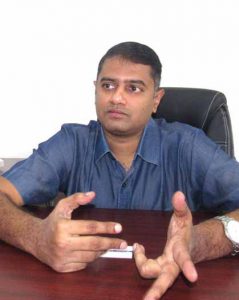 Can we expect any growth in 2018 compared to 2017 in both export and domestic?
Can we expect any growth in 2018 compared to 2017 in both export and domestic?
Yes, definitely. We’re not dealing directly with the export market but we’re dealing with the exporters and there are people who have done the pricing in a methodical way rather than believing only on the drawbacks. People have to be calculative in terms of the risk that they’re taking. We can see a difference between the people who are doing well and the people who aren’t doing well. It’s the way in which they’ve built on their principles, the mission they’ve gone in for expansion, the product innovation as well.
With the growing competition with Bangladesh for the basic products, do you think Tirupur has to go for value added innovative products?
We are working with people who are planning to set-up factories in Bangladesh who have a big setup in India also. They want to run them but they still want to setup in Bangladesh because they aren’t able to afford the overheads and the duty advantage in Bangladesh. So that price wise, they can be more competitive. So what they’re doing is, they’re making their Indian units only for specialized products, which cannot be done in Bangladesh. So as an industry, I cannot say, but there are people who are definitely going to experience growth in value added products.
Tirupur is primarily cotton based but you’re doing lots of blends and innovative things. What is the trend today in blends especially?
Now, the blends are becoming cheaper. 100 per cent viscose is cheaper than cotton. For blends, the acceptance is definitely much more than what it used to be a couple of years ago. So depending on the requirements, we are also doing many blends. The fibre manufacturers companies like Birla, Lenzing are now promoting the blended fabric. We are also partnering with them.
The demand for Viscose is definitely picking up in the domestic market. There are still certain segments, which demand only cotton products. But some of them have moved on to cotton rich because of the duty structure.
If you look at the world and the way polyester has been innovated into sportswear, why has Tirupur been unable to take that market?
It is the mindset of the people. The other reason is the price competition. If you see, there’s a lot of parity within Indian market. For example, if a dyer is using the same machine, same quality of dyes and making the product in Tirupur, you’ll notice that if someone is making a product of the same quality in Ludhiana or Mumbai, the prices in Tirupur are working out to be costlier. This is because of the overheads they have to take in terms of the ETP, the pollution control and things like that. That is the main challenge here and because of that, compared to everywhere else, dyeing is costlier here. It’s the same with knitting; it is costlier in Tirupur compared to Ludhiana.
So, it’s not worth enough to go for polyester ultimately because of the price?
No, it is the mindset. It is kind of a cash quantity. If there are polyester volumes, than the prices can be better.
What about the blend like bamboo and others which are developed for the eco-friendliness?
Regarding the eco-friendly products, we are doing bamboo. There has been an increase in demand of innerwear developed from bamboo blend.
But it’s primarily coming from China only?
No we are able to get it in India. There are few spinners who are doing it in India. We are able to get the yarn from India but fibre is imported. This segment is growing now. The thing is that the price is viable. But it depends on the application because where it depends where it is going to be used.
In future, which blend do you think would be more in demand?
Yes, bamboo definitely. People want to move away from 100 per cent cotton. For the basics, it is going to be cotton and cotton-Lycra for the next five years. But apart from the basics, people are asking for blends like bamboo, Modal, TENCEL. Predominantly, people are asking for micro-moral and then bamboo. So in the near future, we will see bamboo blends with cotton for innerwear. Even now people are asking for certain blends because of the wicking property mixed with polyester. That is also a market which is going for the innerwear segment.
Now, as a fabric manufacturer, you do lot of value-addition. So you can give complete finished fabrics.?
Firstly, we don’t want to call ourselves fabric manufacturer or supplier. We want to be known as a fabric solution provider. We want to give you a fabric, which would complement your product, which is going to make you viable in the market for a long period. So, in that way, to answer your question, yes, we do all the value added work. However, we have in house knitting facilities and finishing & processing is outsourced to our reliable partners.
Is there any plan for you to further go for these value additions, like you have in knitting?
Not in the near future but yes, maybe in a couple of years if that is where the demand is.
Apart from domestic, are you doing export also?
We are not much into exports because our production capacity is for majorly catering to the domestic demand. But down the line we have started exploring more export markets and have starting exports on a very small scale.
In spite of all this, do you still feel that 2018 should be good for Tirupur as a manufacturing center?
As I said, it depends on the people. If they’re able to take up products which can compete with other international markets, maybe then there would be a quick change in the mindset. There are certain things, what I see is, there is a kind of a mindset at the buyer level also, I’ve seen buyers from abroad who’ve seen our products and liked it.
So what are your future plans as a fabric manufacturer?
We are more into the newer, innovative products than into the volumes. Yes, volumes will play a role but that’s a different segment. For us establishing longterm business relationships are more important. So we are not going to increase the capacities for the run of the mill kind of products. However, We are going to add machineries for the specialised fabrics.


